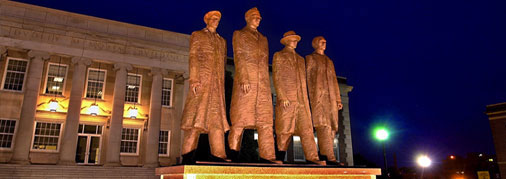
Pre-Conference Options:
Tuesday morning, April 8, 2008
Reaching Latino Clientele Workshop | Tour of NIEHS and EPA
Participants must register in advance and pay a $49 registration fee. Deadline for Pre-Conference Tour registration is March 17, 2008. Due to security requirements at federal facilities, tour participants must be prepared to show a photo ID (driver's license, company ID, government ID, or university ID) to enter EPA and NIEHS facilities. The registration fee for the pre-conference workshop or tour includes program and materials, a protein-packed continental breakfast, beverage break, and transportation. Participants will be responsible for lunch on their own.
2008 PRIESTER NATIONAL EXTENSION HEALTH CONFERENCE DETAILED PRE-CONFERENCE AGENDATUESDAY, April 8, 2008 (MORNING) |
|
Time/Session |
Description |
7:30 8:30 AM |
Breakfast and Registration for Pre-Conference Participants |
8:00 AM 12:30 PM Pre-Conference Tour |
Tour of EPA and NIEHS facilities in Research Triangle Park (transportation provided) |
| 8:30 11:30 AM Pre-Conference Workshop | Reaching Latino Clientele: How to Effectively Serve Latino Families and Youth; Ms. Frida Bonaparte, Mississippi State University and Dr. Andrew Behnke, NC State University |
| 11:30 AM 12:30 PM | Lunch on Your Own (tour participants "lunch on your own" at NIEHS cafeteria) |
| 1:00 PM | Full Conference Begins |
Tour of NIEHS and EPA
The National Institute of Environmental Health Sciences and the United States Environmental Protection Agency have major research facilities located in Research Triangle Park, NC. Visits to these two premiere facilities will focus on highlights of recent and ongoing research into the influence of environment on human health and the impact of the quality of our environment on the web of life and our planet's future. Both facilities house state-of-the-art research laboratories, conference facilities, and cafeterias and feature green space. In developing the Research Triangle Park campus, EPA created one of the largest models of green building in the world and accomplished this on a standard construction budget. In fact, the U.S. Green Building Council based some of its first guidelines for sustainable buildings on features of this campus.
The mission of the NIEHS is to reduce the burden of human illness and disability by understanding how the environment influences the development and progression of human disease. Experience tells us that virtually all human diseases can be caused, modified, or altered by environmental agents. The NIEHS is in a unique position to focus on the interplay between environmental exposures, vulnerable populations, human biology, genetics, and the common diseases that limit our longevity and quality of life. NIEHS scientists have:
- Demonstrated that nighttime exposure to artificial light stimulates growth of human breast tumors in mice, while extended nighttime darkness slowed tumor growth. These results might explain why female night shift workers have a higher rate of breast cancer, and why breast cancer incidence in industrialized countries is on the rise.
- Demonstrated that lifetime lead exposure may increase the risk of developing cataracts, the leading cause of blindness.
- Identified a brain protein that may block the progression of Alzheimer's disease by inhibiting the effects of beta-amyloid peptidem, a protein found in patients with Alzheimer's disease that disrupts brain signals that may contribute to the memory loss associated with the disease.
- Discovered that years of exposure to high concentrations of tiny particles of soot and dust from cars, power plants and factories can increase a person's risk of dying from lung cancer and heart disease, equivalent to the risk associated with prolonged exposure to second-hand tobacco smoke.
- Demonstrated that children playing an abundance of outdoor sports in areas where ozone levels are high may be three times more likely to develop asthma than children who do not take part in outdoor sporting activities.
- In collaboration with U.S. Department of Housing and Urban Development researchers, found that indoor dust samples collected from randomly-selected U.S. bedrooms contain unexpectedly high levels of dust mite and cockroach allergens that could pose a significant risk for the development of allergic diseases and asthma.
Research at the EPA Research Triangle Park facility focuses on how humans and ecosystems are exposed to various pollutants, the extent of that exposure, and the health and ecological effects that result from such exposure. The National Health and Environmental Effects Research Laboratory (NHEERL) is the EPA's focal point for scientific research on the effects of contaminants and environmental stressors on human health and ecosystem integrity. Its research helps identify and understand the processes that cause pollution and helps evaluate risks that pollution poses to humans and ecosystems. Studies confront persistent or refractory issues, such as: global climate change and the relationship between airborne particles and increased rates of respiratory illness. The National Exposure Research Laboratory (NERL) conducts research programs through laboratory and field research in the chemical, physical, and biological sciences. Research provides scientific understanding, information, and assessment tools that improve exposure measurement methods and risk assessments for environmental stressors such as: chemicals, biologicals, radiation, climate, land use, and water use changes. Both fundamental and applied research is conducted to characterize patterns of pollution in air, soil, lakes, rivers, estuaries, stream and lake sediments, and groundwater systems, as well as exposure to environmental pollutants in humans and wildlife.
Registrations for the NIEHS and EPA tour must be submitted by Monday, March 17. No late registrations can be accepted.
Workshop:
"Reaching Latino Clientele: How to Effectively Serve Latino Families and Youth"
Presenters:
Frida Bonaparte, Cross-Cultural Communicator, Mississippi State University
Andrew Behnke, Ph.D., Assistant Professor and Human Development Specialist, North Carolina State University
Workshop Description: This workshop is designed to help Extension professionals and Latino service providers better reach and serve the members of our nation's growing Latino population. It will bring together experts and novices from around the nation interested in collaborating with community partners and members of the Latino community to develop and deliver effective extension and outreach programs. Through interactive exercises, presentation and roundtable discussion the following topics will be addressed:
- Understanding the Latino Culture
- Communicating Across Cultures
- Connecting with the Latino Community and Building Trust
- Suggestions for Extension Agents and Others Working with Latinos
- Developing Culturally Appropriate Programs for Latino Youth
- Teaching and Learning Situations
- Latino Programming Needs and Resources
- Spanish and English Web pages
- Keys to Effective Extension Programs with Latino Audience
About Ms. Bonaparte:
Frida Bonaparte is a Cross-Cultural Communicator working in the office of Agricultural Communications at Mississippi State University. She consults with faculty members, program leaders, administrators, communicators, and others across all Extension Service program areas to assess educational needs and opportunities among Spanish-speaking residents of Mississippi. Ms. Bonaparte teaches in-person and distance learning Spanish Classes. She prepares educational bilingual materials such as DVD's, PSA's, and workshops and translates documents into Spanish. She leads the Hispanic/Latino Round Table for Extension personnel. Ms. Bonaparte is the chair of the Association for Communications Excellence (ACE) International Special Interest Group. She worked as a Cross-Cultural Communicator at Oklahoma State University where she received her Masters Degree in Agricultural Education.

About Dr. Behnke:
Andrew O. Behnke, PhD, is assistant professor of human development and an extension parent specialist at North Carolina State University in Raleigh. Though a native Texan, he holds masters and doctoral degrees in family studies from Utah State University and Purdue University. He conducts applied research on marginalized (i.e., poor, rural, [im]migrant) families, academic achievement among Latino youth, parent involvement in academics, stress and parenting, Latino fatherhood, poverty, and family and community partnerships. He is working to create educational programs to address the disparities in health care, nutrition, financial awareness, housing, and academic youth outcomes among Latinos in North Carolina.




